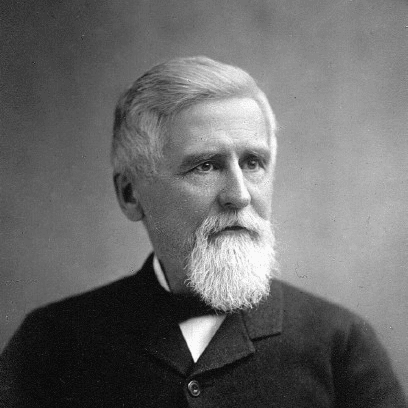Presidential Address
In Memoriam
From the American Historical Review 15:2 (January 1910)
Henry Charles Lea (September 19, 1825–October 24, 1909), the dean of American medievalists, died in Philadelphia on October 24, aged eighty-four years. Born in Philadelphia in 1825, he was educated privately, never attending school or college. The grandson of Matthew Carey and the son of another eminent publisher, he was from 1843 to 1880 actively engaged in the business of publishing. During the Civil War he took a prominent part in the work of the Union League, and he was one of the founders of the Municipal Reform Association of Philadelphia, and for some years chairman of its executive committee. But though he was not neglectful of the duties of a good citizen, his life, outside his business, was passed in studious retirement, devoted to the careful composition of a long series of historical works, which not only gave him the highest position among American medievalists, but won him a greater repute among European scholars than has been obtained by any other American historian of our time. It was perhaps because he had at the beginning been a votary of physical science and came from a family eminent in political economy, that when he entered the field of history he chose, not one of the sub jects of narrative conventional among American historians in those days, but themes of the most substantial importance in the history of social institutions and of civilization. His first book, Superstition and Force, Essays on the Wager of Law, the Wager of Battle, the Ordeal and Torture, appeared in 1866. He was soon led to the study of the institutions of the medieval Church, and all his later books may be classed as attempts to complete our knowledge of the relations of those institutions to the development of civilization and of modern thought. His Historical Sketch of Sacerdotal Celibacy appeared in 1867, his Studies in Church History in 1869, his History of the Inquisition of the Middle Ages, in three volumes, in 1888, Chapters from the Religious History of Spain in 18go, A History of Auricular Confession and Indulgences, in three volumes, in 1896, The Moriscoes of Spain in 1901, A History of the Inquisition of Spain, in four volumes, in 1906-1907, and The Inquisition in the Spanish Dependencies in 1908. Several of these books have been translated into other languages, and all have been the theme of much discussion and usually of high praise in European historical journals. They are marked by extraordinary learning, by patience and industry and skill in the finding and criticism of original materials, by clearness and sobriety of style, solidity of judgment, breadth of view, and endeavor after impartiality. Much as the books have been used for purposes of controversy, most of the best students, Catholic or Protestant, have recognized in the author the possession of the qualities named. As to the actual attainment of an impartial view, the opinions of those most competent to judge have varied more widely. To the Catholic, it could not well seem that the picture of medieval Christianity drawn in the first chapter of the History of the Inquisition, for instance, was a fair one, or that one who approached the Church primarily as a dispassionate student of its jurisprudence could so well depict its essential nature and influence as one who looked upon it with more sympathy, and with chief regard to its spiritual life. Whatever conclusions a serener age may reach in this particular, there can be no . question of the bright illumination which Mr. Lea’s researches have cast into many obscure yet important pathways of medieval history, nor of the lustre which his high qualities and great achievements have lent to American historical scholarship. To this journal he was from the first a constant friend, and a valued contributor. In 1902-1903 he was president of the American Historical Association. Personally he was a modest and retiring man, the generous friend of historical scholars. He imparted to them with freedom the privileges of the remarkable library which his wealth and learning had enabled him to collect, and at his death he bequeathed it to the University of Pennsylvania.
Bibliography
Chapters from the religious history of Spain connected with the Inquisition. By Henry Charles Lea. Philadelphia, Lea Brothers, 1890; Reprint, New York: Burt Franklin, 1967.
A history of auricular confession and indulgences in the Latin church. By Henry Charles Lea. 3 vols. Philadelphia: Lea Bros., 1896; Reprint, New York: Greenwood Press, 1968.
A history of the Inquisition of Spain. By Henry Charles Lea. 4 vols. New York, The Macmillan Company; London, Macmillan & co., ltd., 1906–07; Reprint with an introduction by Edward Peters. New York: AMS Press, c1988.
A history of the Inquisition of the middle ages. By Henry Charles Lea. 3 vols. New York, Harper & brothers, 1887; Reprint, New York: Russell & Russell, 1958.
Materials toward a history of witchcraft. 3 vols. New York: AMS Press, 1986.
The Moriscos of Spain; their conversion and expulsion. Philadelphia, Lea Brothers & Co., 1901; Reprint, New York: Haskell House Publishers, 1968.
Studies in church history. The rise of the temporal power–Benefit of clergy. Excommunication. By Henry C. Lea. Philadelphia, H. C. Lea; London, S. Low, Son, & Marston, 1869.
Superstition and force; essays on the wager of law, the wager of battle, the ordeal, torture. 4th ed., rev. New York, B. Blom, 1971.
